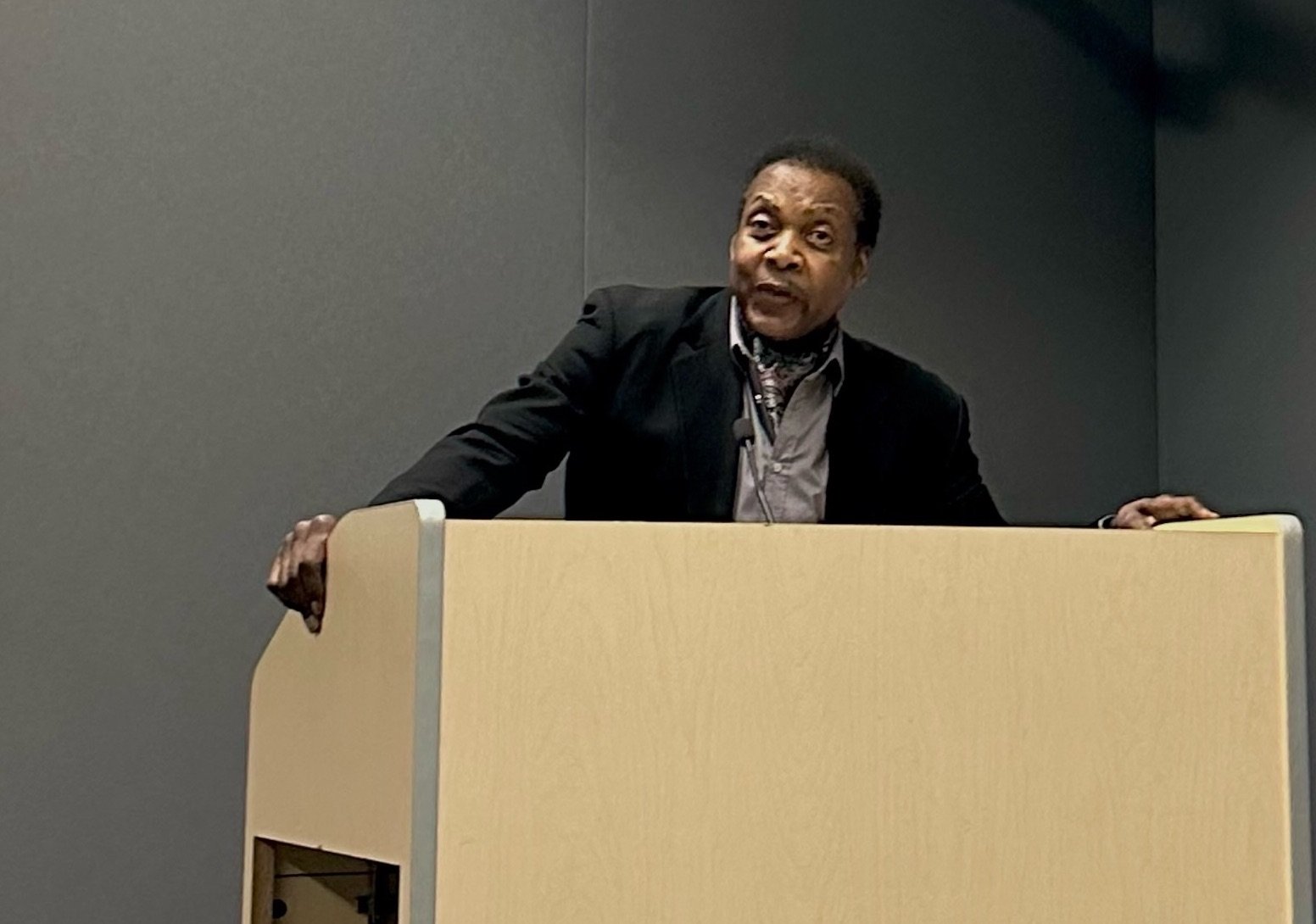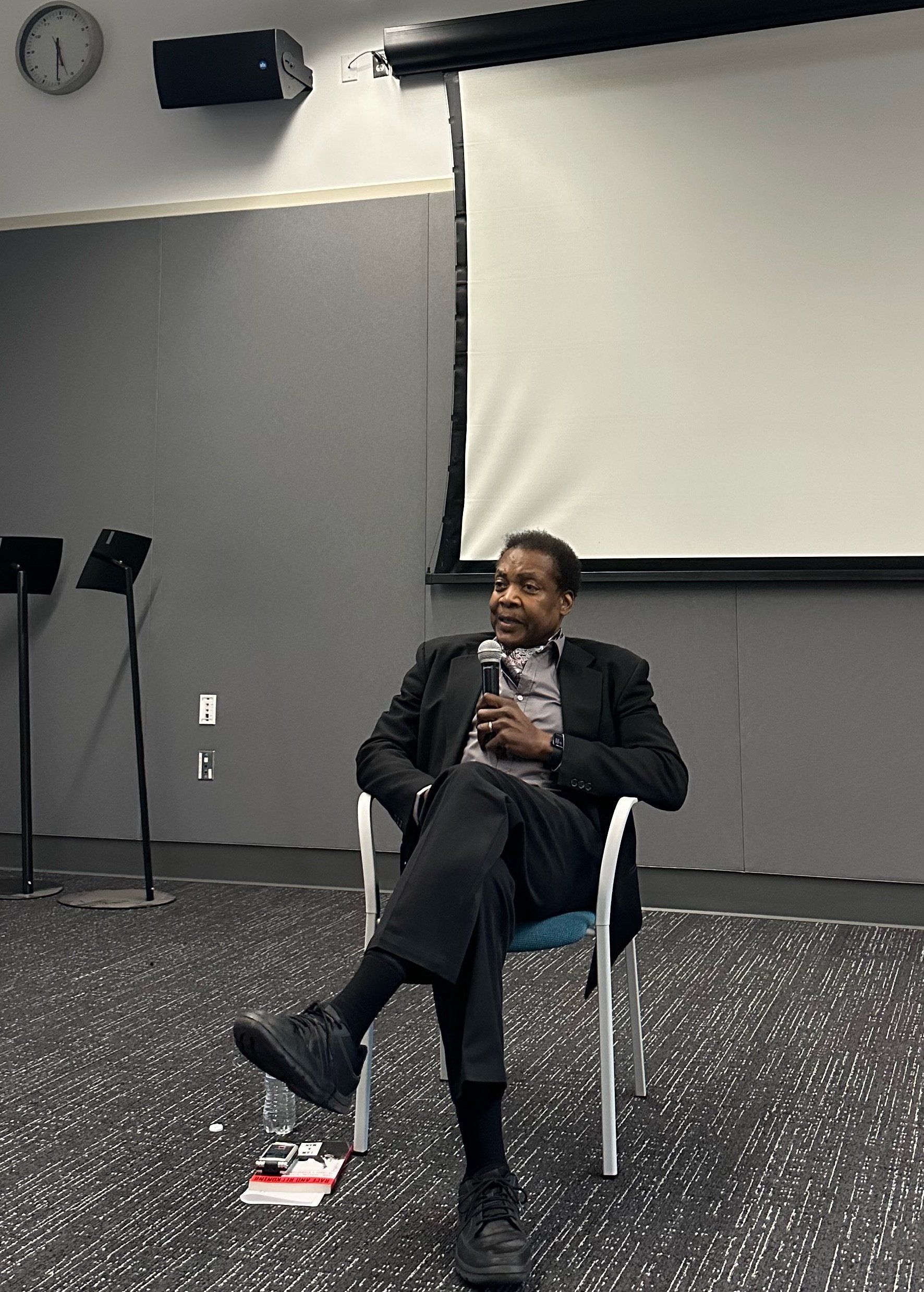By Lian Benasuly
The future of American democracy is entering dangerous territory, says author and civil rights scholar Ellis Cose, who spoke at UC Santa Barbara last week. Many states are using politics to limit the study of race and racism in schools. Black men are subject to police brutality daily in the 21st century. And leaving African American voices out of history books is only adding fuel to the fire, Cose said.
“Rewriting history makes it difficult to understand why this system sees young Black men as a threat, and often treats them as such before they treat them as anything else. It makes it hard to deal with the reality of America today,” Cose said.
Civil liberties and American democracy author and scholar Ellis Cose spoke to a UC Santa Barbara audience last week about the current threats to American democracy.
Since the nation’s founding, two distinct threats to democracy in the United States have only intensified—a social threat and an institutional threat, said Cose. He blamed both the educational curriculum and our foundational institutions, including the Constitution, which led to inequities in representation.
Although both pose dangers to our democracy, the social threat presents a more pervasive risk to the future of American democracy, he said at a talk sponsored by the Walter H. Capps Center for the Study of Ethics, Religion and Public life.
“The institutional threats can be changed, if we can get a consensus of like-minded and relatively sane people to do that,” Cose said. “The [social threat] is rooted in deep emotions illogic and it’s harder to change that because you have a lot of deeply held beliefs that just don’t make sense.”
UCSB’s Capps Center partnered with Cose’s Renewing American Democracy project to bring him to campus. The project is run by Long Island University, Northwestern University’s Medill School of Journalism, and the USC Annenberg Center on Communication Leadership & Policy and aims to uplift voices left out of the conversation on American democracy.
Cose has written a dozen books that concern race, democracy and civil liberties. His talk at UCSB outlined the premise of his most recent one, “Race and Reckoning: From Founding Fathers to Today's Disruptors,” which traces how democracy in the U.S. has evolved over centuries, leading it to now enter dangerous territory.
During the event, Cose told stories about American history and his own life to address what he considers threats to our democracy.
When Cose’s daughter was seven years old, she asked him why Black people in the U.S. need a month of their own. He explained to her about the slave trade, the Jim Crow era and the civil rights movement of the 1960s. She then asked him if the U.S. president at the time of slavery was Black.
For Cose, this conversation with his daughter underscored the importance of Black History Month.
“The only president she had known had been Barack Obama,” Cose said. “From her perspective, it was perfectly logical. Why couldn’t the president be Black, or for that matter be a woman?”
Since America’s founding, African American narratives have consistently been left out of the educational curriculum, Cose said. So, in 1926, scholar Carter Woodson decided to establish the second week of February as Negro History Week to deepen the study of African American History in the U.S. This eventually evolved to Black History Month, officially marked since 1976.
But even in the 21st century, African American narratives are left out of the equation, Cose says, which alters how both Black and non-Black students in the U.S. come to understand the African American experience.
Democracy and civil liberties expert Ellis Cose spoke at UC Santa Barbara at a talk titled, “Let’s Talk About Democracy,” organized by the Walter H. Capps Center and the Renewing American Democracy project.
He noted that 18 states have passed anti-Critical Race Theory laws to impose restrictions on curriculum about race and racism that may engender “feelings of guilt” in students for past actions by others of their race.
“The purpose of [this] legislation is to protect supposedly vulnerable people from dangerous history. Because if school kids are taught that we had a history that had some ugly stuff, and that had some discriminatory stuff, then they may find it hard to sleep at night,” Cose said. “Therefore, it’s much better to just ignore that history altogether.”
But protecting some individuals from feelings of guilt and shame will not create a more equitable future in the U.S., because selective history compels people to conform to the status quo, he believes.
“Rewriting history makes it easy to accept that where we are now in terms of disparities is the natural order, as opposed to being something that was created by society,” Cose said.
Institutions and foundational documents that this country was built upon—including the Constitution—pose an addition threat to democracy. To illustrate this, Cose cited differences in U.S. demographics in the late 1700s compared to now.
In 1779, Virginia was the most populous state at only eight times the size of the smallest state, Delaware. But now, the most populated state—California—is 67 times the size of the smallest state—Wyoming. So, the two-senator rule written into the Constitution does not make sense for our democracy today, Cose says.
“We have this document here, which has helped this country to survive but also has this structure that has made us into an increasingly undemocratic society,” Cose said. “The Constitution was created by geniuses and worked quite well for 1789 America. But we don’t live in that America anymore.”
Still, Cose doesn’t believe young Americans need lose all hope. He urges Generation Z to elect people to Congress who they believe will help find solutions to these threats.
“It’s going to take a lot of effort by a lot of people, but I don’t think individuals are powerless in society. I think if we acknowledge this, then that will lead us in a better direction,” Cose said.
Lian Benasuly is a fourth-year student studying communication and minoring in professional writing through the journalism track. She is a web and social media intern for the Division of Humanities and Fine Arts.



